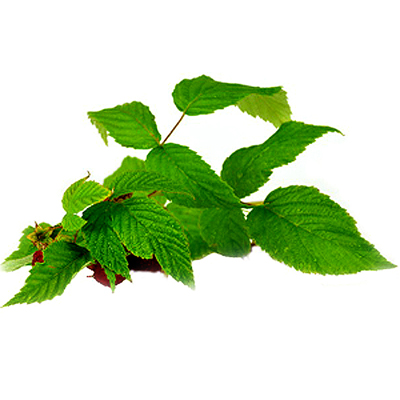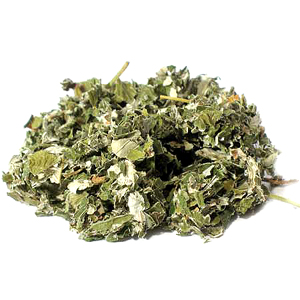No products
Raspberry leaf - 50g
(Folium Rubi idaei)
Raspberry leaf (Folium Rubi idaei) tea is appropriate to use in diarrhea, intestinal and gastric catarrh and colic. For its softness it can be used by children. Relieves spasms at the time of menstruation. It is recommended to drink in the last months of pregnancy...
![]()
Content |   |
Binomial nameRubus idaeus Commonly called (often known as)Red raspberry or European red raspberry StorageStore in a dry place at a temperature up to 25°C |
Description of herb
Raspberry (Rubus idaeus Linné - "rubus" from the Latin "ruber" = red, "idaeus" according to Mount Ida) - up to 2 meters tall, deciduous shrub with rod-shaped shoots, is the original domestic plant in a temperate zone of the northern hemisphere from the lowlands to mountainous areas throughout Europe and Asia, where it occurs in light forests, clearings and sunny slopes.
In medicine, a leaf is used, the extracts of which are used for gargling in inflammation of the oral cavity, to combat skin diseases and especially for women's problems. It is also a valuable part of year-round herbal tea blends.
Healing effects
Raspberry tea has a very beneficial effect on the digestive tract. It has stimulating effects on digestion, especially to promote bile secretion and facilitate digestion in general.
Due to its anti-diarrheal effect, Raspberry tea is suitable for diarrhea, intestinal and gastric catarrh and colic, the course of which alleviates and supports the treatment of these unpleasant problems. An immense advantage is the subtlety of its action, thanks to which we can also give it to children.
It can also be used for coughs and colds and to help lower the temperature.
Raspberry tea can also be used as part of cleansing treatments, because it has a diuretic effect and thus helps to remove settled toxic substances from the body - "cleanses the blood". Its application is also suitable for many problems with the bladder, such as its insufficient activity, urinary stones or inflammation. We will include tea from the Raspberry leaf in our drinking regime even if we suffer from water retention in the body and swelling of the limbs.
Women will appreciate another indisputable positive of Raspberry and the fact that tea from its dried leaves alleviates cramps and unpleasant conditions during menstruation.
Raspberry is recommended to drink in the last 3 months of pregnancy, because it stimulates smooth muscle contractions and should facilitate and shorten the birth.
On the contrary, for obvious reasons, use in the first months of pregnancy is not recommended.
In the past, the leaves were also treated for skin problems, especially of the inflammatory and chronic type. Tea, preferably a decoction of Raspberry leaves, is used as a gargle to treat inflammation in the oral cavity. In the case of inflammation in the oral cavity, periodontitis and inflammation of the throat, the decoction of the leaves can be applied without fear several times a day for intensive rinsing and gargling.
Active substances
Raspberry leaves contain
- tannins
- organic acids
- flavonoids
- mineral substances
- essential oils
- vitamins
Properties
Antioxidant, anti-inflammatory, anti-diarrheal, immunostimulant, antispasmodic.
Recommended at
- women's problems
- in the last months of pregnancy
- menstrual problems
- intestinal catarrh and for good digestion
- bladder problems
- cough
- cold
- "cleans the blood"
- heals the gums and skin
- inflammation in the oral cavity
- periodontitis
Preparation and dosing
TEA 1
Preparation: Pour 250 ml of boiling water over a tablespoon of dried leaves and let it infuse for a few minutes, strain.
Dosing: 2-3 times a day
TEA 2
Preparation: Pour 300 ml of cold water over a large spoon of dried leaves, bring to a boil and cook briefly, let it infuse for 5-10 minutes, then strain.
Dosing: Use it as a gargle or as a tea for more acute bladder problems and for diarrhea and colic.
Side effects
There are no known side effects or adverse reactions. Raspberry is also used as an additive in teas for long-term use.
REMEMBER: Tell all your health care providers about any complementary health practices you use. Give them a full picture of what you do to manage your health. This will help ensure coordinated and safe care.

